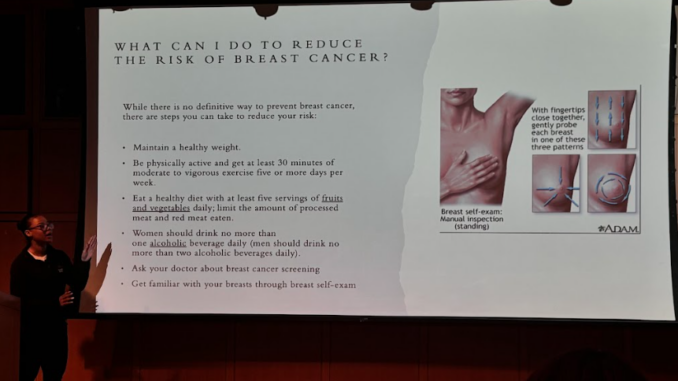
By T’Neil Gooden
October is Breast Cancer Awareness Month, and the Brooklyn College Cancer Center (BCCC) is using this month to bring attention to the impacts breast cancer and breast cancer screenings have on women of color. On Oct. 10, the Center organized a panel of leading breast cancer researchers and survivors to speak about the disease, questions to ask during and after your diagnosis, and how to advocate for oneself to doctors.
According to the American Cancer Society, breast cancer impacts one in eight women in the United States, and last Thursday’s panel focused on the effects of breast and cervical cancer on Black women and the hardships faced when learning to speak up for their healthcare. Serrina Goodman, a breast cancer survivor of over 12 years and the coordinator/cancer advocate of the non-profit cancer support organization SHARE Cancer Care and its AfroSHARE program, discussed with participants the importance of getting a yearly mammogram and ultrasound and speaking up for one’s healthcare.
“You must always ask for a mammogram and an ultrasound, not only Black women but all women, you must do it together,” Goodman told the audience. “When you do the mammogram by itself you may miss something, always do them together.”
Breast cancer can develop in four main areas: in the breast, the lobes, milk ducts, and the stroma. Breast cancer is not limited to these areas, but tends to form in and be connected to them.
“If you have any pain, cough, masses, or something that lasts more than two weeks you need to go and check in with your local doctor,” Fernando Camacho, a medical oncologist, told the audience in a video by SHARE. “You are the CEO of your own body and you should speak up for yourself because no one else will.”
According to the American Journal of Preventive Medicine (AJPM), Black women are 30% more likely to develop cervical cancer and 60% more likely to develop aggressive breast cancer than white women. Additionally, African American women who are under the age of 45 are more commonly developing breast cancer than white women.
Black women, when diagnosed with breast cancer, get the disease on the more aggressive end. A type of breast cancer that is specifically aggressive and impacts Black women more is called Triple Negative Breast Cancer (TNBC), according to the American Cancer Society. This is why advocating for screenings for early detection is very important to the survival of women of color who get the disease.
“When women are diagnosed with breast cancer at stage zero, they have a 100% survival rate, and that is why early detection and examination is so important, especially in women of color,” Loreini Acevado, the clinical research coordinator at Mount Sinai Tisch Cancer Institute’s Community Outreach Center, told the audience. “The longer you don’t advocate for yourself, delay your mammogram, and the things you feel, the lower the survival rate.”
According to panelists, it should not have to come down to money to have access to good healthcare, especially for a diagnosis like this one.
“Unfortunately, this happens most of the time to women of color,” Goodman said. “The truth of the matter is that everyone should have access to quality healthcare regardless of the amount of money you have in the bank, it should not decide whether you should live or die.”
SHARE is currently coordinating free support groups, screenings, helplines, and newsletters that can guide all women to have a place where they can learn to speak up for themselves and find community when it comes to the disease. BCCC is continuing to advocate and provide resources to women of color who have been impacted by breast cancer, or know someone who has, by hosting talks and research sessions. They will also be walking in the Making Strides Against Breast Cancer Walk on Oct. 27 to fundraise for the cause.
“We are here to tell our story about a road that you don’t want to go down yourself,” Goodman told the audience. “Get yourself checked and advocate for all the things that you feel within your body, because only you know what you are feeling.”
Those who are interested in learning more about breast cancer awareness can visit BCCC’s website at https://bccc.blog.brooklyn.edu/ or join the newsletters and support groups that SHARE has to offer at https://www.sharecancersupport.org/
